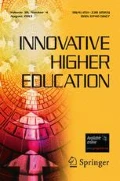Conclusion
This study demonstrated that nontraditional students, no matter how fragile, can be transformed into full members of the college academic and social community. The importance of this finding cannot be over stated, for it points to real hope for students who do not see themselves as “college material” or who feel that college life has little or nothing to do with the realities from which they come. What is needed to transform these students is for faculty, administrators, and counselors to fully engage in the validation of students and to recognize that not all students can be expected to learn or to get involved in institutional life in the same way. Diversity in nature is a strength. So is diversity among college students. The challenge is how to harness that strength, and how to unleash the creativity and exuberance for learning that is present in all students who feel free to learn, free to be who they are, and validated for what they know and believe.
Similar content being viewed by others
References
Astin, A. (1985).Achieving educational excellence: A critical assessment of priorities and practices in higher education. San Francisco: Jossey-Bass.
Belenky, M., Clinchy, B., Goldberger, N., & Tarule, J. (1986).Women's ways of knowing: The development of self, voice, and mind. New York: Basic Books.
Glaser, G. & Straus, A. L. (1967).Discovery of grounded theory: Strategies for qualitative research. Chicago: Aldine Publishing Co.
Palmer, P. (1993). Good talk about good teaching: Improving teaching through conversation and community.Change, 25(6), 8–13.
Pascarella, E. & Terenzini, P. (1991).How college affects students: Findings and insights from twenty years of research. San Francisco: Jossey Bass.
Study Group on the Conditions of Excellence in American Higher Education (1984).Involvement In Learning. Washington, D.C.: National Institute of Education.
Tinto, V. (1987).Leaving College. Chicago: University of Chicago Press.
Additional information
Laura Rendon has a Ph.D from the University of Michigan. She is currently an associate professor in the Division of Educational Leadership and Policy Studies at Arizona State University. She studies instructional and institutional issues related to the success of minority students, particularly Hispanic students and two-year colleges.
Rights and permissions
About this article
Cite this article
Rendon, L.I. Validating culturally diverse students: Toward a new model of learning and student development. Innov High Educ 19, 33–51 (1994). https://doi.org/10.1007/BF01191156
Issue Date:
DOI: https://doi.org/10.1007/BF01191156



